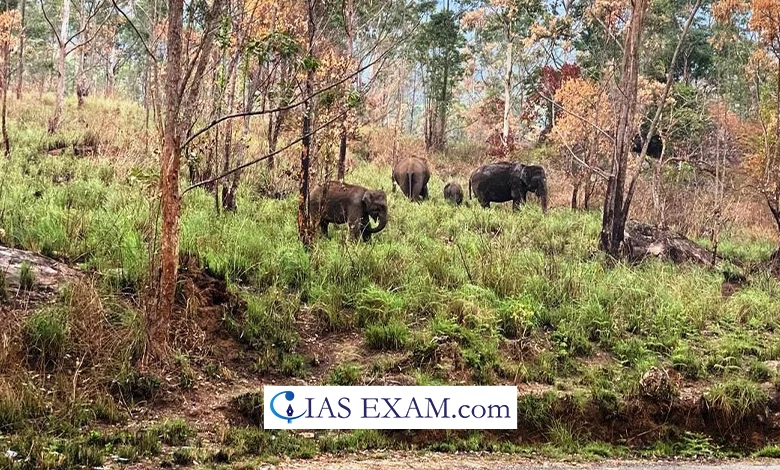Removing Exotic Plants from Forests Secures Food for Wildlife
Syllabus: Environment and Conservation [GS Paper-3]

Context
Forests are the lifeline of our planet, providing sustenance and shelter to a vast array of wildlife. However, the increasing presence of exotic plant species in forests has become a significant threat to the survival of native wildlife. In recent news, a study by the Kerala State Forest Protective Staff Organisation has highlighted the importance of removing exotic plants from forest areas to ensure food security for wild elephants.
Impact of Exotic Plants on Wildlife
- Exotic plants, also known as non-native or invasive species, are plants that have been introduced to an ecosystem outside of their natural range.
- While these plants can provide a wider variety of food, they can also compete with native species for resources such as water, sunlight and nutrients in the soil leading to decline of the native plants quality and population.
- This may have a transfer effect throughout the whole ecologic complex with the predators depending on native plants for their food and accommodation.
- If exotic plants such as invasive black wattles or eucalyptus trees are present the food plants of the elephants are reduced.
- For elephants, large spaces of natural grasslands are certainly the best thing, so they can move freely. However, the presence of exotic plants can prevent elephants from accessing such spaces.
- The result could be that the elephants would intrude into the human habitation looking for food hence the conflict between humans and elephants is a result of environmental change.
Measures to Mitigate the Impact of Exotic Plants
To address the issue of exotic plants in forests, several measures are being taken. These include:
- Identification and removal of exotic plant species: There are many initiatives to tackle the invasive plants in the forest. This could be a very competitive job when we try to differentiate the native species from the exotic ones since it is a difficult matter.
- Restoration of native plant species: After completely getting rid of the remaining ‘alien’ plants, now efforts are being made to re-plant the local native plant species onto the original area. This can be communicated through restoration of native species and creating suitable conditions to their survival.
- Community engagement and awareness: Educating the community in the local area will be beneficial in their understanding on how the exotic plants affect the flora and fauna. This can encompass education and community outreach initiatives for communities to be actively engaged in the removal and conservation work.
- Collaboration and policy support: Collaboration among the global agencies, NGOs and communities is a fundamental principle to control the issue of exotic plants in forests. Policy framework is also vital to be in place to secure the required conducive environment for action.
Recent Developments and Achievements
Several recent developments and success stories highlight the importance of removing exotic plants from forests. For example:
- Wild elephants are pages long. This study has brought about the need to eradicate such pests from forest areas.
- The Chinnakkanal panchayat, in Kerala, has started a project, in which three hectares of forestland is being planted with grass in order to help wild elephants find their food.
- The World Wildlife Fund (WWF), in a few countries including India, is considering restoring the forests and removing exotic plant species.
Conclusion
In conclusion, removing exotic plants from forests is crucial to securing food for wildlife. The impact of exotic plants on native ecosystems can be significant, leading to a decline in native plant populations and a reduction in food sources for wildlife. Measures such as identification and removal of exotic plant species, restoration of native plant species, community engagement and awareness, and collaboration and policy support are essential to address this issue. Recent developments and success stories highlight the importance of taking action to protect our forests and wildlife.
Source: The Hindu
UPSC Mains Practice Question
Q. Discuss the ecological and environmental impacts of removing exotic plant species from forests and its implications for wildlife food security, with a focus on sustainable management practices and conservation strategies.





.png)



